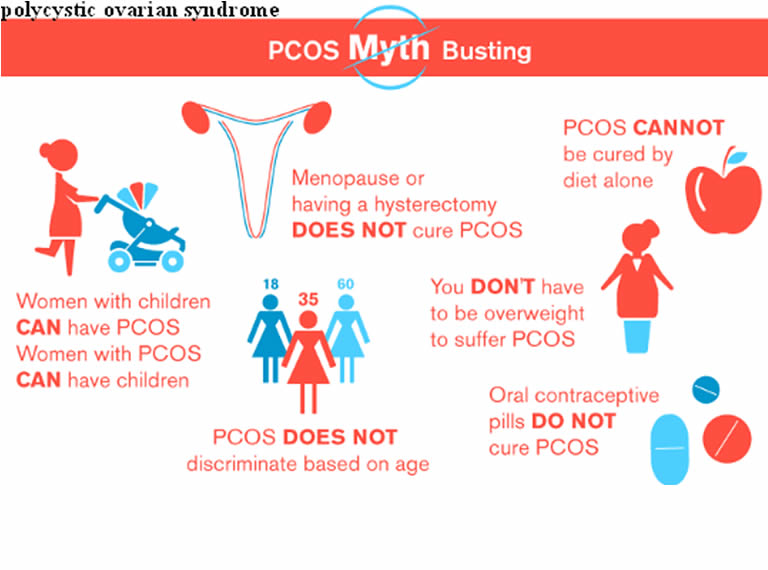
Polycystic Ovary Syndrome (PCOS)
PCOS is the most common gynaecological issues confronting most women of reproductive age. It is estimated that between 5 to 10 percent of females of reproductive age are affected by PCOS. This makes PCOS the commonest gynaecological reasons women present with to their gynaecologist
Its other common names are Polycystic Ovarian Syndrome, Hyperandrogenism or Androgen Excess Syndrome.
Common symptoms of presentation include menstrual irregularities– heavy or scanty menstrual flow, overweight, small ovarian cysts, infertility, hirsutism (excess body and facial hair), acne or oily skin, acanthosis nigricans (patches of black & thickened skin) and long term – metabolic syndromes like diabetes, raised blood pressure.
Diagnosis: Joint consensus meeting of the European Society of Human Reproduction and Embryology and the American Society for Reproductive Medicine in 2003: recommended that at least 2 of the following 3 features are required for PCOS to be diagnosed:
- Oligo-ovulation or anovulation manifested as oligomenorrhea or amenorrhea
- Hyperandrogenism (clinical evidence of androgen excess) or hyperandrogenemia (biochemical evidence of androgen excess)
- Polycystic ovaries (as defined on ultrasonography with 12 or more follicles in at least 1 ovary measuring 2-9 mm in diameter or a total ovarian volume of >10 cm3.
Laboratory investigations that we do includes – AMH, Day 2 LH, FSH, Prolactin. Testosterone (total and free), 17hydroxy progesterone and TFT. We also will recommend pelvic ultrasound scan to ascertain polycystic ovaries and a Day 21 progesterone serum levels to confirm ovulation. Other relevant tests that we find useful are serum Iipid profiles and glucose levels. In case of infertility we also ask for fallopian tubal patency test to be done, if timed sexual intercourse or intrauterine sperm inseminations are considered following ovulation induction.
The diagnosis of PCOS requires the exclusion of all disorders that can result in menstrual irregularity and hyperandrogenism.
Common treatments or management options include:
Lifestyle changes— (first-line option) – such as weight loss and physical exercise are crucial and may be important in symptoms control. For example a decrease of about 5% of the women’s gross weight may be enough to normalise her menstrual irregularities and restart her ovulation. Weight reduction to maintain BMI ≤ 30 is advisable. The British Fertility Society suggested differing fertility treatment until BMI ≤ 35. Medications like orlistat can be used for weight control and in recalcitrant cases bariatric surgery is reportedly effective.
For menstrual irregularities: medications including combined oral contraceptive pills and other hormonal drugs can be used.
Cosmetic methods for removing excessive facial/body hair, like plucking, shaving or waxing are useful in women with hirsutism.
Patients needing treatment for fertility related issues are considered for fertility medications including clomiphene citrate – (Clomid, an anti-oestrogen) or gonadotropins injections, followed by timed sexual intercourse or intrauterine sperm inseminations (if lifestyle modification options of treatment failed).
If hormonal medication treatment are unsuccessful we can proceed to laparoscopic (key-hole) ovarian drilling (LOD). Women with PCOS who have not responded to clomifene citrate should be offered LOD. It is as effective as fertility injections used for ovarian hyperstimulation and is not associated with an increased risk of multiple pregnancy.
As a last resort, and if all else failed In Vitro Fertilisation (IVF) is recommended – Several stimulation protocols have been published for the treatment of patients with PCOS undergoing IVF. Recent treatment modalities involving In vitro maturation of human oocytes (IVM) is available, albeit not widely practised and currently not in vogue. Immature eggs (2-8mm follicles) from unstimulated ovaries are retrieved and then matured in the laboratory followed ICSI. Embryos are then transferred at Day 2 or 3 post fertilisation.
Do you have polycystic ovarian disease or syndrome or any of its associated problems?
Is it menstrual problems, acne, excessive hair growth or infertility issues; we will work with you to find clinically effective treatment regimen that is evidence based.
We are available to help and work with you to achieve effective solutions.
Please call us, send a text, or email us for consultant specialist appointments and treatments.
Opening Hours
Saturday: 10:00am-4:00pm
Sunday: 10:00am-1:00pm
